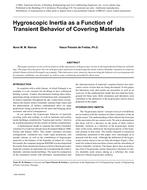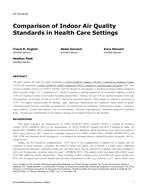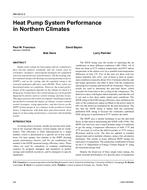In hot and humid climates, dampness in buildings leads to significant respiratory symptoms and damage to buildings. A damp house can be recognized by one or more of the following characteristics: damp stains, mold growth, condensation, a musty smell or stuffy atmosphere, and insects such as silverfish and sow bugs. To improve this problem, a desiccant cooling system has been suggested as a suitable system to improve indoor air quality (IAQ) by its superior performance of humidity control. However, this system has a defect in its lower energy efficiency, so combining it with a power generation system, such as a cogeneration system, is a common solution to improve energy efficiency. In this paper, the authors study the applicability of combining a desiccant cooling system with a heat pump through experiments in hot and humid climatic conditions and propose a new HVAC system for the next generation.
Units: SI
Citation: ASHRAE Transactions, vol. 112, pt. 1
Product Details
- Published:
- 2006
- Number of Pages:
- 6
- File Size:
- 1 file , 4.3 MB
- Product Code(s):
- D-28020


